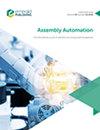Optimal grasp force for robotic grasping and in-hand manipulation with impedance control
IF 1.7
4区 计算机科学
Q3 AUTOMATION & CONTROL SYSTEMS
引用次数: 6
Abstract
Purpose The purpose of this paper is to achieve stable grasping and dexterous in-hand manipulation, the control of the multi-fingered robotic hand is a difficult problem as the hand has many degrees of freedom with various grasp configurations. Design/methodology/approach To achieve this goal, a novel object-level impedance control framework with optimized grasp force and grasp quality is proposed for multi-fingered robotic hand grasping and in-hand manipulation. The minimal grasp force optimization aims to achieve stable grasping satisfying friction cone constraint while keeping appropriate contact forces without damage to the object. With the optimized grasp quality function, optimal grasp quality can be obtained by dynamically sliding on the object from initial grasp configuration to final grasp configuration. By the proposed controller, the in-hand manipulation of the grasped object can be achieved with compliance to the environment force. The control performance of the closed-loop robotic system is guaranteed by appropriately choosing the design parameters as proved by a Lyapunove function. Findings Simulations are conducted to validate the efficiency and performance of the proposed controller with a three-fingered robotic hand. Originality/value This paper presents a method for robotic optimal grasping and in-hand manipulation with a compliant controller. It may inspire other related researchers and has great potential for practical usage in a widespread of robot applications.阻抗控制下机器人抓取和手操作的最佳抓取力
摘要多指机械人手具有多种抓握构型和不同的自由度,因此多指机械人手的控制是一个难点问题,其目的是实现稳定的抓握和灵巧的手部操作。为了实现这一目标,提出了一种新的对象级阻抗控制框架,优化了抓取力和抓取质量,用于多指机械手的抓取和手持操作。最小抓握力优化的目标是在满足摩擦锥约束的情况下,在保持适当的接触力的前提下,实现稳定的抓握。利用优化后的抓握质量函数,通过在物体上从初始抓握构型向最终抓握构型的动态滑动,获得最优抓握质量。通过所提出的控制器,可以实现对被抓物体的手握操作,并与环境力保持一致。通过Lyapunove函数证明,合理选择设计参数可以保证闭环机器人系统的控制性能。通过三指机械手的仿真,验证了所提控制器的效率和性能。提出了一种基于柔性控制器的机器人最优抓取和手持操作方法。它可以启发其他相关研究人员,在机器人的广泛应用中具有很大的实际应用潜力。
本文章由计算机程序翻译,如有差异,请以英文原文为准。
求助全文
约1分钟内获得全文
求助全文
来源期刊

Assembly Automation
工程技术-工程:制造
CiteScore
4.30
自引率
14.30%
发文量
51
审稿时长
3.3 months
期刊介绍:
Assembly Automation publishes peer reviewed research articles, technology reviews and specially commissioned case studies. Each issue includes high quality content covering all aspects of assembly technology and automation, and reflecting the most interesting and strategically important research and development activities from around the world. Because of this, readers can stay at the very forefront of industry developments.
All research articles undergo rigorous double-blind peer review, and the journal’s policy of not publishing work that has only been tested in simulation means that only the very best and most practical research articles are included. This ensures that the material that is published has real relevance and value for commercial manufacturing and research organizations.
 求助内容:
求助内容: 应助结果提醒方式:
应助结果提醒方式:


